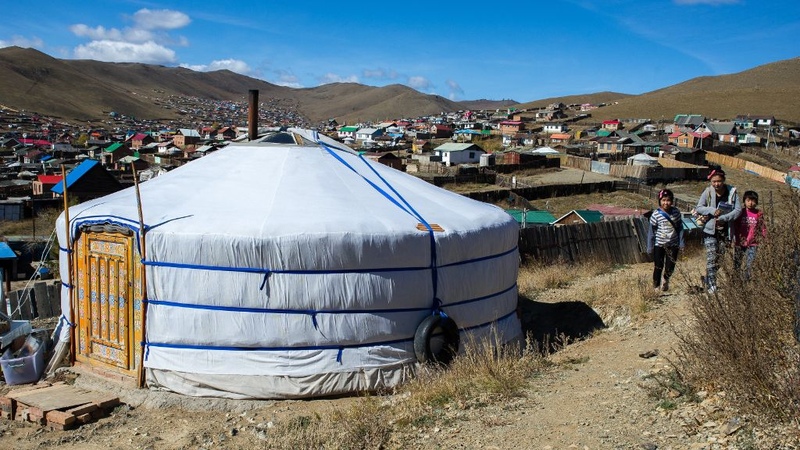
AKIPRESS.COM - The Asian Development Bank’s (ADB) Board of Directors has approved an $80 million loan to help transform ger areas in Ulaanbaatar into affordable, low-carbon, climate-resilient, and livable eco-districts.
ADB will additionally administer a $95 million loan and a $50 million grant from the Green Climate Fund (GCF), as well as a $3 million sector grant from the High-Level Technology Fund (HLTF), established in 2017 to provide financing for innovative solutions in ADB projects.
A third of Mongolia’s population live in urban ger areas, or settlements of low- and middle-income households. These districts suffer from poor sanitation, inadequate solid waste management, and limited water supply, which pose health and environmental hazards. A heavy reliance in these ger areas on coal and biofuels for heating and energy generates large carbon dioxide emissions and worsens air pollution, especially during winter.
“About 850,000 people live in Ulaanbaatar’s ger areas and have poor access to urban services,” said ADB Senior Urban Development Specialist Mr. Arnaud Heckmann. “This project will improve the lives of around 100,000 people, including 10,000 direct beneficiary households that will have access to green housing units, by financing 20 new environmentally friendly districts with good services, green spaces, and access to shops and jobs.”
Incremental growth and migration are increasing the population living in these poor conditions because affordable housing options for low- and middle-income households are very limited. A 2016 survey by the Capital City Housing Corporation estimated housing demand at 150,000 units, while available affordable housing stock is about 4,000 units, with 60% of ger areas residents willing to move to apartment units if acceptable and affordable solutions are proposed.
The project is a large-scale initiative to provide sustainable and comprehensive solutions to transform sub-standard, highly vulnerable, highly emitting, and polluting ger areas into affordable, low carbon, climate-resilient, and livable eco-districts.
The Ulaanbaatar Green Affordable Housing and Resilient Urban Renewal Sector Project will build 1,500 social housing units along with key infrastructure such as roads, water, sewerage, and heating pipes, as well as green houses for urban farming and public and green spaces; social and public services; and rooftop solar panels and a smart monitoring system for building performance and renewable energy control financed by the HLTF.
The project will also provide $75.7 million out of the GCF loan to the eco-district and affordable housing fund (EDAF) that will make long-term loans to commercial banks, which will be passed on to real estate developers to build an additional 8,500 homes—including 5,500 affordable and 3,000 market rate units—and commercial activities, and to provide low-cost mortgages. The loan to EDAF is expected to leverage around $300 million more in investments from developers, commercial banks, and beneficiaries. The Asset Management Company of the Development Bank of Mongolia will manage EDAF on behalf of the Ministry of Finance. The GCF grant will be used to provide performance-based grants to qualified developers for climate change mitigation and adaptation features.
A key element of the project is the voluntary land swapping approach for implementing the eco-districts. Under this approach, households owning or renting a plot of land within the proposed eco-district perimeter can choose to participate or not on the mechanism. If they opt to participate, households will have access to a housing unit in the eco-district, through land and asset swaps, rent-to-own schemes, or affordable rental arrangements. If they choose not to participate, the eco-district design will be adjusted to avoid affecting the non-participating household. A community participation plan, which includes skills training and linkages with job opportunities for poor households, will also be implemented.
Institutional and policy improvements, meanwhile, will guide the transformational impacts of the project with respect to regulations, standards, and sector capacity for climate-responsive urban planning; increased performance, energy efficiency, and renewable energy in buildings; improved supply and access to low-carbon affordable housing; sustainable green housing finance; and eco-efficient urban services.
The project is expected to be completed by the end of 2026 and will cost a total of $570.1 million.
ADB is committed to achieving a prosperous, inclusive, resilient, and sustainable Asia and the Pacific, while sustaining its efforts to eradicate extreme poverty. Established in 1966, it is owned by 67 members—48 from the region. In 2017, ADB operations totaled $32.2 billion, including $11.9 billion in cofinancing.
